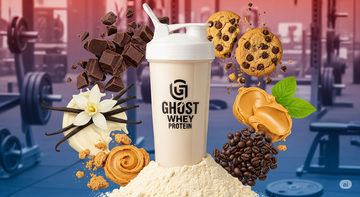Embarking on a fitness journey demands more than just regular workouts; it also requires paying close attention to nutrition, particularly protein intake. With the plethora of protein supplements available, it's crucial to choose one that aligns with your fitness goals and dietary preferences. This article delves into the nuances of whey protein and plant protein, offering a comprehensive guide to help you make an informed choice, whether you're looking to build muscle, lose weight, or maintain a balanced diet.
TL;DR
Whey protein, derived from milk, is a complete protein rich in essential amino acids and is highly effective for muscle building and recovery. Plant protein, sourced from peas, rice, and other plants, offers a vegan-friendly alternative that, when combined correctly, can provide a complete amino acid profile. This guide compares whey and plant proteins in terms of nutritional content, digestibility, fitness goals alignment, and environmental impact, assisting you in selecting the ideal protein supplement for your diet and fitness objectives.
Understanding Whey Protein and Plant Protein
What is Whey Protein?
Whey protein is a complete, high-quality protein derived from milk during the cheese-making process. It contains all nine essential amino acids that the body cannot produce on its own, making it an excellent source of protein for muscle building and recovery. Whey protein is available in various forms, including concentrate, isolate, and hydrolysate, with whey protein isolate being the purest form with the highest protein content.
What is Plant Protein?
Plant protein, on the other hand, is derived from sources such as peas, rice, hemp, soy, and other plant-based ingredients. While plant protein may not always contain all essential amino acids, combining different plant protein sources can provide a complete amino acid profile. Vegan protein powders are popular options for those following a plant-based diet or looking to reduce their consumption of animal products.
Nutritional Comparison
Protein Content
Whey protein is known for its high protein content, with whey protein isolate containing upwards of 90% protein by weight. Plant protein powders vary in protein content depending on the source and processing methods, with some containing around 70-80% protein by weight.
Amino Acid Profile
Whey protein is rich in all essential amino acids, particularly leucine, which plays a crucial role in muscle protein synthesis. Plant protein may be lower in certain essential amino acids, but combining different plant protein sources can help achieve a complete amino acid profile.
Carbohydrates and Fats
Whey protein isolate typically contains very low levels of carbohydrates and fats, making it a popular choice for those looking to minimize their calorie and macronutrient intake. Plant protein powders may contain slightly higher levels of carbohydrates and fats, depending on the source and processing methods.
Digestibility and Absorption
Whey Protein Digestibility and Absorption
Whey protein is highly digestible and rapidly absorbed by the body, making it an ideal choice for post-workout recovery and muscle protein synthesis.
Plant Protein Digestibility and Absorption
Plant protein may have slightly lower digestibility and absorption rates compared to whey protein, but this can vary depending on the source and processing methods. Some plant protein sources, such as pea protein, have been shown to have high digestibility and absorption rates comparable to whey protein.
Fitness Goals and Protein Selection
Muscle Building and Recovery
For individuals looking to optimize muscle building and recovery, whey protein is often the preferred choice due to its high leucine content and rapid absorption.
Weight Loss and Appetite Control
Both whey protein and plant protein can support weight loss and appetite control due to their satiating effects and ability to support lean muscle mass. Choosing a protein powder with minimal added sugars and fats can be beneficial for weight management.
Dietary Restrictions and Preferences
For those with lactose intolerance or dairy allergies, plant protein powders provide a suitable alternative to whey protein. Additionally, individuals following a vegan or vegetarian diet may prefer plant protein options for ethical and dietary reasons.
Considerations for Dietary Restrictions
Lactose Intolerance and Whey Protein
Individuals with lactose intolerance may experience digestive discomfort when consuming whey protein, especially whey protein concentrate, due to its lactose content. Opting for whey protein isolate or plant protein powders can help mitigate these issues.
Allergies and Sensitivities to Plant Protein Sources
Some individuals may have allergies or sensitivities to specific plant protein sources, such as soy or peas. It's essential to carefully read ingredient labels and choose plant protein powders that are free from allergens.
Environmental and Ethical Considerations
Sustainability of Whey Protein Production
The production of whey protein, as a byproduct of cheese-making, can contribute to reducing food waste and utilizing resources efficiently. However, concerns regarding the environmental impact of dairy farming and animal agriculture should be considered.
Ethical and Environmental Impact of Plant Protein Production
Plant protein production, particularly from sustainable and organic sources, can have a lower environmental impact and align with ethical considerations for animal welfare and resource conservation. However, the sourcing and processing of plant protein ingredients can also have environmental implications that should be taken into account.









